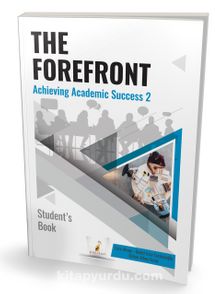The Forefront Achieving Academic Success 2
We would like to thank our colleagues at Middle East Technical University, the Department of Modern Languages, who have taken the time to give us valuable feedback and comments and have encouraged and supported us throughout. Especially the critical feedback has enabled us to think about issues we would not have considered otherwise. Without you, we couldn’t have produced this work.
Another thank you is to the teachers who volunteered to take part in the recording of the instructional videos, namely Ali Caner Alkan, Melek Altun, Hürana Aydın, Murat Aydın, Seher Balbay, Tamay Ergüven Orhan, Esin Korkut Savul, Filiz Sözen, Jason Steinberg, and Elif Şeşen. The time and effort you put in to help us are much appreciated.
We would also like to say thank you to the members of the administration, Derem Çanga, Gökçe Sert, and Meriç Gülcü Kurç, for the autonomy they granted us, for answering our questions even when we asked too many of them, and for their support and trust, as always. They have found the time, always, to give feedback and help in the middle of their busiest times.
Once again, we thank Sinem Bür and Başak Kösereisoğlu, whose theme and materials in the first module have inspired the rest of the book.
We would also like to thank each other, as co-authors, for the honest comments and constant but fair criticisms that we made of each other’s work and for the endless WhatsApp discussions, which enabled us to see things from new and different angles. These fueled us to constantly revise and fine-tune what we have created.
And, of course, our deep gratitude for our families, especially our children and pets 🙂 , for whom we were too busy much of the time.
THE AIM OF THE BOOK
The Forefront, Achieving Academic Success 2, the second book of the series, also follows an integrated approach and aims to improve the academic skills of first-year university students. Thematic reading and listening materials, which follow the theme of inclusion, lead to productive skills, writing and especially speaking, which are the two skills the book mainly targets.
The activities in the book allow students to engage in current controversial topics and analyze them in depth by considering different perspectives. The book also highlights the importance of research in academia and its integration into speaking and writing. The tasks provide plenty of opportunities for students to do research and use what they find as evidence. These enrich students’ ideas and arguments when writing and speaking.
To help students master the target skills and accomplish more autonomous and extended speaking and writing tasks, extensive input on these skills has been included. Building on the writing input in the first book of the series, this one focuses on the essay, one of the most common genres students write at university. The two common academic speaking genres taught in the book are Socratic seminars and debates. Written and spoken samples are also provided, which students can use as models.
We hope the book provides guidance for both teachers and students and helps students to become independent, mature, and confident writers and speakers of English.
The Forefront Achieving Academic Success 2 kitabını indir

